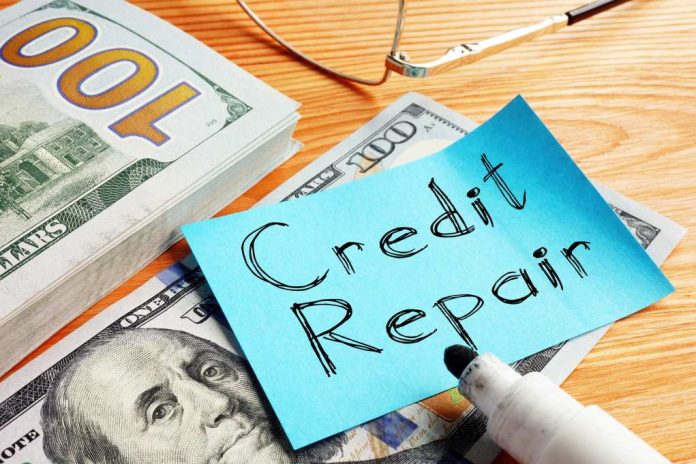
Managing credit is a difficult task for many Americans. Some people can find themselves at a critical point where they feel like they need the help of a professional. That is why credit repair companies are an option that people consider. These companies may be able to help improve the health of your credit report which ultimately can improve your credit score! However, are these companies actually worth it?
Understanding Your Credit Score
When people are frustrated with their credit, they often wonder, “what is the point of a credit score?” You may be in the same boat, and that’s okay. The purpose of a credit score is an important part to understand.
Credit scores are a way that lenders can predict the risk associated with a consumer. For example, let’s say you decide you want to get a personal loan from a bank. In a perfect world, the banks would be able to provide you with any amount of money and have the guarantee that you will repay it. However, not everyone can handle the financial responsibility of a loan. A person’s credit report may show signs of late payments, evictions, repossessions, and more. A person with a less than ideal credit report that has a bunch of negative marks will be riskier for the lender compared to someone with no negative marks on their report.
A majority of lenders (90% to be exact) in America use the FICO Scoring model when analyzing the information on a person’s credit report. The FICO scoring model rates credit reports on a scale of 300 to 850. This is what becomes your credit score. A good general rule of thumb is the better the credit score, then the more financial opportunities.
What Factors Impact Your Credit Score?
There are five major categories that impact your FICO score which include:
- Payment History (35%)
- Amount You Owe (30%)
- Credit History (15%)
- Hard Inquiries (10%)
- Variety of Credit (10%)
Payment History
Unsurprisingly, this is the biggest factor that plays a part in your credit score. 35% of your score is based on your payment history! That is why it is so important to make sure that you pay your bills on time. If you have any late payments on your report, other factors like how late the payment was, how long ago was the late payment, and how many late payments you have will determine just how much impact you will see.
Amount You Owe
Many people think that having any sort of balance on your credit card can bring down your score. That’s not entirely true. Actually, as long as it’s a small balance that uses no more than 30% of your available credit, then you won’t see much impact. For example, if you have a balance of $1,000 between two credit cards, then you should aim to keep your credit usage to no more than $300 between those cards. This balance is referred to as your credit utilization ratio! This ratio is responsible for 30% of your FICO score since it is another important factor for lenders to consider.
Credit History
Your average credit history will be an important factor of your credit score (around 15%). It will look at both your oldest credit accounts as well as your newest ones. This is how it finds the average age of all of your accounts. That is why if you open up a new account you may see a decrease in your score. You should keep in mind that older accounts with an older average age will help your score overall.
Hard Inquiries
There are two types of inquiries when it comes to your credit. There are soft inquiries and hard inquiries. Hard inquiries make up roughly 10% of your credit score while soft inquiries do not have any impact at all. That is because soft inquiries only provide a peek at your score without providing too much information. In order for lenders to access your full credit report they need to receive written consent. Only hard inquiries provide that visibility and require that written consent! Hard inquiries will not impact your credit forever and usually fall off after about 2 years.
Variety of Credit
Lastly, your credit mix which makes up 10% of your score. The variety of credit you have can play a role in determining your credit score. Just like an investment portfolio, diversity can be beneficial! Some different types of credit accounts include:
- Credit Cards
- Mortgage Loans
- Retail Accounts
- Installment Loans
If you want to improve your variety of credit accounts then you should do so responsibly. If you try to open up too many new accounts at the same time you may face a bigger negative impact on your credit compared to spacing out the applications.
What is a Credit Bureau?
A credit bureau is basically just a fancier way of saying a credit reporting agency. Regardless of what you call it, a credit bureau is responsible for collecting, and researching the credit information of individuals. They then can sell it to lenders for a fee which is what lenders use to determine a person’s creditworthiness. Even though there are three main credit bureaus, there are plenty of others as well.
How Does Your Credit Score Compare?
The FICO Score 8 scoring model ranges from as low as 300 all the way to 850. If you are using this scoring model as your reference then there are 5 different “categories” of how you can define your credit score. As a general rule of thumb, the higher the score, means the better financial opportunity. The different score levels include:
- Exceptional
- Very Good
- Good
- Fair
- Poor
Exceptional
When people handle their credit the right way, they can see an exceptional score that ranges from 800 to 850. If a person has this score they can expect to have the lowest available interest rates and find that they get approved more for applications.
Very Good
If a person has a score of 740 to 799 then they are considered to have a very good credit score. This score can still make it easy to get approved and provide more affordable interest rates compared to having a lower score.
Good
An average credit score in America is within the good range. A good score falls within the range of 670 to 739. Lenders generally view this score as “acceptable” in terms of the quality of the borrower. This score can still provide a variety of financing options but there will likely be higher interest rates compared to the best available.
Fair
Unfortunately if your score is between 580 to 669, it is considered just fair. Individuals with this score may be disqualified from traditional mainstream loans since they are considered subprime borrowers.
Poor
This is the worst rating that you can have when it comes to your credit. If your score falls between 300 to 579 then you have a poor score. A majority of lenders will deny these applications unless there is another layer of security. For example, a secured credit card would be a much more realistic option for those with this score instead of an unsecured one due to the security deposit involved with a secured card.
What are Credit Repair Companies?
A credit repair company is defined as an organization that specializes in helping consumers repair their credit through credit report analysis. Once the company analyzes the credit report, they will then dispute inaccuracies with either the credit bureaus or the lenders.
Consumers typically turn to these types of credit repair organizations when they feel that their credit issues are too difficult to deal with on their own.
Credit repair companies advertise that their experience and knowledge is what makes the process easier to handle for customers. This knowledge means the fact that they understand the process involved for fixing inaccuracies, know the legality around credit repair, and more.
What’s the Difference Between a Credit Repair Company and a Credit Counseling Agency?
When people are dealing with credit issues, they may have come across credit counseling agencies. These agencies are different from a credit repair company in many ways. They are pretty different even though they both deal with credit.
On one hand you have a credit repair agency that focuses on a consumer’s credit report to dispute inaccuracies. If eligible, these inaccuracies will be dropped from the credit report which will remove the negative impact that they have on the credit score.
On the other hand, there are credit counseling agencies that aim to help consumers by providing education. They can help people understand why their credit is the way that it is and show how a person may be able to improve their credit situation.
How Do Credit Repair Companies Work?
You can expect credit repair companies to review your credit report from the major credit bureaus. The three major credit bureaus are TransUnion, Experian, and Equifax. After they analyze your credit report, they will create a plan to tackle the issues they see.
Understanding Step 1: Review Your Credit Report
When credit repair companies look at your credit report, they will generally start by looking at common credit report errors like:
- Inaccurate Accounts
- False Inquiries
- Irrelevant Accounts
- Duplicate Accounts
If a credit report has a bunch of inaccuracies then they will have a negative impact on your score. Credit repair companies will look for these inaccuracies to decide how they want to go about repairing your credit.
Understanding Step 2: Their Plan of Action
How they want to handle your credit repair will depend on your credit report. However, there are common practices that credit repair companies use like “jamming”. Jamming refers to when a credit repair company sends a bulk amount of dispute letters through the mail to a lender or credit bureau. If the recipient doesn’t respond within a specified time frame then they are obligated to drop the disputed claim. This is a common practice among credit repair companies in how they choose to handle credit repair.
How Much Does a Credit Repair Service Cost?
There is no set amount for credit repair. The price you will pay will depend on the company you choose and the type of service you get. Typically, you can expect payments to be set up in either a one-time flat rate, based on each inaccuracy, or in the form of monthly payments to the company.
It is important to note that the Credit Repair Organizations Act is an important piece of credit repair payment. That is because this act outlines the fact that credit repair companies cannot request or receive payment until the promised services are delivered to the consumer.
Regardless of the price charged by the credit repair company, many people may see that it’s worth it in the long run if they are able to ultimately improve their credit score. That is because a better score can result in cheaper interest rates and more financing options. However, just because some people think this cost is worth it, doesn’t mean that’s actually the case!
How to Confirm a Credit Repair Service is Legit?
Unfortunately, just like many other industries, there are scammers that aim to take advantage of consumers looking to get credit repair. You can expect to see some scammers in the credit repair industry. That is why it is important to first verify a credit repair company before deciding to get their help. You can easily confirm the legitimacy of a company by asking the right questions, reading reviews online, and seeing if they are certified.
You can also be on the lookout for red flags. Common red flags of suspicious credit repair companies include:
- A Demand for an Upfront Payment: This is illegal to do! You have no reason to pay upfront.
- False Advertising: If a credit repair company promises to remove all negative items then you should see this as a red flag. They can’t guarantee false claims like promises to remove all negative marks on your credit regardless of the validity. False advertising may be a sign of an unreliable company.
- Uneducated: If the credit repair company doesn’t provide direct answers to your direct questions then you may be dealing with a company that isn’t legit.
- Misinformation: A lot of scam credit repair companies take advantage of the fact that their consumers need help. That is why you need to be aware of your rights as a consumer. If they lie about your rights or don’t know them then that should be a huge red flag.
- Fraudulent Behavior: If the credit repair company encourages you to misreport or misrepresent yourself or your information then you should know that this company is not legit!
Questions to Ask Credit Repair Companies
If you are interested in getting a credit repair company, you want to make sure that you are asking the right questions. While you may need to ask more or different questions besides the ones on this list, these can provide you a good place to start:
- How are you priced?
- Is there a money back guarantee?
- Can you guarantee that my score will improve?
- What’s the process involved?
- When can I expect to see results?
- Do you work with attorneys?
These questions can help you determine whether or not getting the help from a credit repair company is truly worth it.
How Long Will it Take to Repair Your Credit?
Unfortunately there is no direct answer to this question either. Instead, how long it takes is based on your credit report, financial situation, and more. For example, if your credit report has three, simple inaccuracies that are easy to dispute then that will take less time and someone that has dozens of complex inaccuracies.
Under the Fair Credit Report Act, credit bureaus must correct or remove any inaccuracies typically within 30 days from when they are reported. However, it can still take longer depending on the situation at hand.
Can a Credit Repair Company Remove Debt?
It’s a common misconception that credit repair companies can help you remove or handle debt. Even if a credit repair company offers debt assistance services, they are typically separate from the normal scope of credit repair responsibilities.
Credit repair companies are not able to erase your debts. Their focus is on making sure that the items on your credit report are completely accurate so that any inaccuracies on your credit report are not negatively impacting your credit score.
Are Credit Repair Services Legal?
Luckily, credit repair services are legal so long as they follow applicable laws. This is specifically relevant to states like Georgia that have special legislation around credit repair. There is also legislation, like the Credit Repair Organizations Act, that sets guidelines for credit repair services and companies to meet.
The Credit Repair Organizations Act requires credit repair companies to explain information to the consumer like:
- The consumer’s legal rights in regards to credit repair (in a written agreement).
- Services that will be provided to the consumer.
- Costs involved with the services.
- Consumer abilities like the option to cancel after three days for no charge.
- The length of the process.
- Legit Guarantees that are offered by the company.
Do You Need a Credit Repair Service?
Not necessarily! You can do whatever a credit repair company does. However, people typically tend to choose these companies for support to save time and effort when trying to repair their credit. Credit repair companies also already have the knowledge in place when handling credit repair so that makes it even easier for consumers to use their services.
Alternatives to a Credit Repair Company
A legit credit repair company may be able to help. However, you should keep in mind that anything these companies can do, you can do too. If you take the time to research, then you can do everything that a credit repair company would do, for free. This can save you more money in the end. Alternatives to a traditional credit repair company would be:
- Handling Your Credit on Your Own
- Getting the Help from a Credit Counseling Agency
Handling Your Credit on Your Own
Not everyone is a credit expert. That’s okay! If you take the time to do your homework, then you can do anything that a credit repair company does. For example, a credit repair company may get in touch with a credit bureau to dispute an inaccuracy found. Instead of having them find the inaccuracy and disputing it on your behalf, you could do it yourself.
However, it is important to do your homework to make sure you handle disputes properly. For example, you may be denied a dispute due to a lack of information. Even if you are correct, because you didn’t take the time to research the information you’d need, you could get denied. That is why with a little bit of study time, you don’t need to pay for a service. Handling it yourself can also help you gain more confidence in handling your credit in the long run!
Getting the Help from a Credit Counseling Agency
You may find that you still need some support when it comes to your credit. If you feel like you need that help, you can get in touch with a credit counseling agency. These agencies aim to provide education to consumers. This education can show people how to better handle their credit.
Best Credit Repair Companies of 2021
Now that you understand credit repair companies a little better, you should decide if you want to look into getting one. If this service is something you may want, then it is important to review popular options that may be able to help. Some of the best credit repair companies of 2021 are:
- Lexington Law
- Ovation
- The Credit Pros
- Credit Saint
- CreditRepair.com
Lexington Law
This is a popular company that has been helping consumers for over 15 years. Since they have been in business for so long, many people see this brand as one they can trust. Their mission is “to revolutionize the credit repair industry, by providing ethical and effective credit repair to consumers in need.” They offer three different service packages at different costs.
Many consumers also like Lexington Law because they don’t have a setup fee, don’t have a cancellation fee, and offer discounts of 50% to individuals like veterans, active military members, and spouses of existing customers. However, these benefits may not outweigh some cons of this company like the fact that they may charge more money for additional reports, only offer credit monitoring with some plans, and don’t have a satisfaction guarantee.
Ovation
This is another popular option that consumers choose. Ovation has been in business for 45 years due to a strong, trusted reputation that they maintain with their consumers. They offer two packages at a monthly rate with a startup fee. People like this option due to benefits like a free consultation, discounts for eligible consumers, and a no-risk refund policy.
There aren’t any major drawbacks to this company besides the fact that they only offer credit monitoring in their most expensive package, a startup fee is required, and they only have two packages for credit repair.
The Credit Pros
As a business that has been around for 12 years, the Credit Pros company has been able to help many consumers repair their credit. If this is a company that you are interested in trying, you can benefit from a free consultation. Other benefits to this option include the fact that credit monitoring is available at every service level (not just the more costly options), and they have a 90-day, money-back guarantee. This company doesn’t have too many drawbacks either but the biggest ones are the fact that the one-time fee can be pretty pricey since it starts at $119 and they don’t provide assistance to Kansas, Maine, Minnesota, and Oregon.
Credit Saint
Another company with a strong reputation is Credit Saint. They have been around for 17 years and they aim to remove incorrect credit items like credit inquiries, late payments, judgements, and more. Benefits of this company include the fact that they offer a 90-day, money-back guarantee with easy to understand pricing policies. However, just like many other companies on this list, credit monitoring is only for their more expensive plans. They also have costly startup fees that range from $99 to $195 and have a lack of available online resources.
CreditRepair.com
This company hasn’t been around as long as some of the other options on this list since they have only been around for 9 years. However, they have been able to help with 1.8 million removals since they started! They offer credit monitoring for all of their available packages, and can provide discounts to eligible consumers! However, just like other options in this list they will have a startup fee.
Commonly Asked Questions About Credit Repair
Choosing to get help from a credit repair company isn’t a choice you should make overnight! Proper education can help you make the right decision when it comes to deciding on what would be best for your financial situation.
What is the Consumer Financial Protection Bureau (CFPB)?
When researching credit repair, you may come across the Consumer Financial Protection Bureau (CFPB). This bureau hasn’t been around for long and in fact was created in 2010! The Consumer Financial Protection Bureau is a regulatory agency that oversees financial products and services that consumers can access. There are a bunch of branches of this agency and they all specialize in something whether it be research, consumer complaints, etc.
The Consumer Financial Protection Bureau was created with the goal of making consumer finance markets more efficient through regulation like rules, and the enforcement of those rules. They can help consumers in many ways but specifically can educate and inform consumers about abusive financial practices (like credit repair scams).
Are Credit Repair Companies Worth It?
In order to determine if a credit repair company is worth it, you will need to look at your specific financial situation. If you want to repair your credit, but don’t want to pay for the fees associated with these types of companies then you may be better off just handling your credit repair yourself. You can always take advantage of free consultations that credit repair organizations offer to help you truly determine if their services will be worth it.
Is Your Credit Report the Same as Your Credit Score?
No. Your credit report is not the same as your credit score. However, your credit report does play a determining role in your score. That is why when companies offer a credit repair service, they aim to help remove negative marks on your credit report. This will in turn improve your credit score.
Overall
Your credit score is an important part of life. There are many factors that can negatively impact your score! That is why credit repair companies provide services that can help people try to repair their credit. Credit repair companies help consumers save time and effort when dealing with their financial situation. However, that service doesn’t come for free. So even though you save time and effort, you may not be saving money.
Consumers can do anything that a credit repair company can do. Credit repair companies aim to remove any inaccurate negative marks on a consumer’s credit report through a dispute. These credit repair services can help, but consumers can do the same thing just in different ways. If you are interested in getting these services you should come prepared with some questions that can help you better determine if the company is legit and a good fit for your lifestyle and budget.
Article References
https://www.forbes.com/advisor/credit-score/what-makes-up-your-credit-score/
https://www.cnbc.com/select/hard-inquiries-credit-score/
https://www.investopedia.com/terms/c/creditbureau.asp
https://www.experian.com/blogs/ask-experian/infographic-what-are-the-different-scoring-ranges/
https://www.nasdaq.com/articles/jamming-cleans-your-credit-temporarily-2014-02-20
https://www.thebalance.com/is-credit-repair-illegal-5094336
https://www.creditcardinsider.com/learn/fixing-your-credit-with-a-credit-repair-service/
https://www.forbes.com/advisor/credit-score/best-credit-repair-companies/
https://www.investopedia.com/terms/c/consumer-financial-protection-bureau-cfpb.asp




























